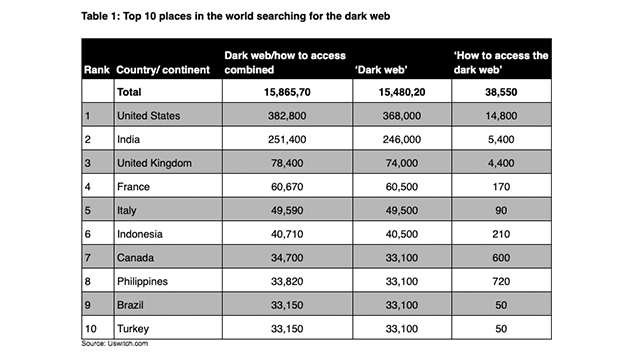According to research by Uswitch, the comparison and switching service, over 1.5 million people across the world are searching for the dark web online. From selling valuable personal data, using details to hack financial accounts, to selling counterfeit and illegal items, the dark web is known as a ‘hotbed of criminal activity’, enabling people to anonymously view and buy illicit materials online via specific browsers.
People in America are revealed to have searched the most online, with 368,000 people using the keywords ‘dark web’ and specifically ‘how to access the dark web’ (14,800) in the past year. Following this, India’s combined dark web searches hit over 250,000 in the past year, with the UK coming in third place eager to learn more about it.
In Europe, excluding the UK, internet users in France are seeking out the dark web the most with 60,670 searches, followed by Italy (49,590), and Turkey (33,150). People often search using keywords both in English and their native language, as translated content online can be limited[3]. However, native searches for the dark web were found to be variably low across the EU, where just 930 searchers in France used both the French and English language to find information. Similarly to France, only 320 Spanish internet users opted to use their native language.
A dark web page is purposely hidden (it doesn’t show up on search engines[2]), where users can only gain access via certain browsers. Out of the options available, Tor has been revealed as the most searched for dark web browser in the world, with a curious 910,730 people actively looking for it. Waterfox comes in second (52,220), and Whonix in third with 21,770 global average monthly searches.
Tor is the clear leader of dark web browsers, as it’s not only the most searched for anonymity browser in America (165,000), but also in areas dominating the dark web such as India (90,500), and the UK (49,500).
How to stay safe online
Commenting on the research, Nick Baker, broadband expert, at Uswitch.com
“If our personal details are placed in the wrong hands and shared on the dark web, this can be pretty dangerous. Before we know it, thousands of hackers could have access to our bank details, private information and passwords. It goes to show that when spending time on the internet, users should be mindful of what they’re sharing, and where.
“There are, however, several ways to avoid having your details hacked and shared on places like the dark web, which will allow you to search on the internet safely using the most popular browsers available.
“Here are our top tips to help the public stay safe online.
1. When making online payments, check the website is safe. Secure sites start with ‘https’, which means they have an SSL certificate (this enables websites to have a secure connection from the server to a browser). Look out for the padlock symbol in the search bar before you make a purchase.
2. Ensure your virus software is up-to-date. If you don’t have adequate antivirus software, your details could be hacked without you realising.
3. Don’t overshare. Keep your passwords varied, using a range of characters in upper and lowercase, and include symbols. This makes your password stronger and less likely to be hacked.
4. Don’t click on a link or open an attachment from anyone you don’t trust, whether that’s in an email, text, or on a website.
5. Reduce the amount of personal information you share online. This could include your birthday, a pet’s name, or your address, as these details could be used for fraud.”



